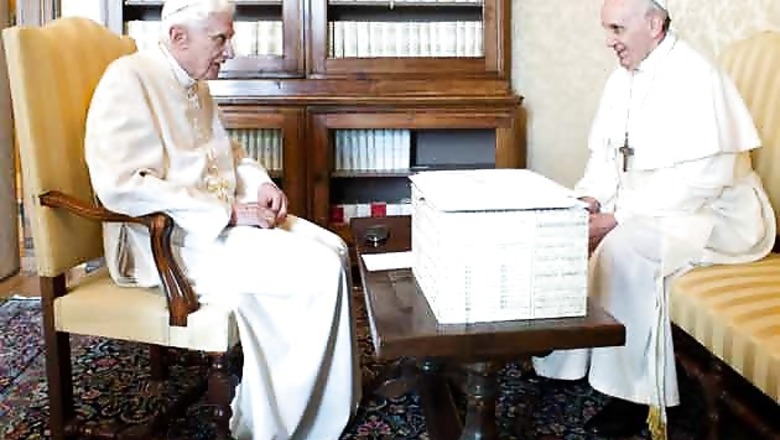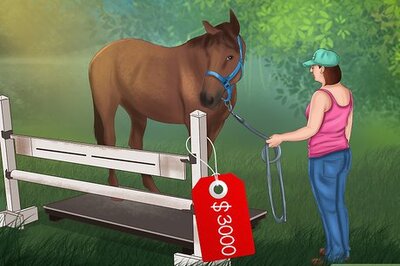
views
Castel Gandolfo: The two men in white embraced and showed one another the deference owed a pope in ways that surely turned Vatican protocol upside down: A reigning pope telling a retired one, "We are brothers," and insisting that they pray side-by-side during a date to discuss the future of the Catholic Church.
Pope Francis traveled Saturday from the Vatican to this hilltown south of Rome to have lunch with his predecessor, Benedict XVI, an historic and potentially problematic melding of the papacies that has never before confronted the church. In a season of extraordinary moments, starting with Benedict's resignation and climaxing with the election of the first Latin American pope, Saturday's encounter provided perhaps the most enduring images of this papal transition as popes present and past embraced, prayed and broke bread together.
"It was a moment of great communion in the church," said the Vatican spokesman, the Rev Federico Lombardi. "The spiritual union of these two people is truly a great gift and a promise of serenity for the church."
Benedict, 85, has been living at the papal retreat in Castel Gandolfo since he stepped down February 28 and became the first pope to resign in 600 years. From the moment he was elected, Francis, 76, made clear he would go visit him, refusing in a way to let Benedict remain "hidden from the world" as he had intended.
Wearing a white quilted jacket over his white cassock to guard against the spring chill, Benedict greeted Francis on the helipad of the Castel Gandolfo gardens as soon as the papal helicopter landed. They embraced and clasped hands. And in a series of gestures that followed, Benedict made clear that he considered Francis to be pope while Francis made clear he considered his predecessor to be very much a revered brother and equal.
Traveling from the helipad to the palazzo, Benedict gave Francis the seat on the right-hand side of the car, the traditional place of the pope, while Benedict sat on the left. When they entered the chapel inside the palazzo to pray, Benedict tried to direct Francis to the papal kneeler in the front, but Francis refused.
Taking Benedict's hands and drawing him near, Francis said, "No, we are brothers," Lombardi said. The two used a longer kneeler in the pews and prayed side-by-side, the papal kneeler facing the altar left vacant.
It was a gesture that, 10 days into Francis' papacy, is becoming routine: a shunning of the trappings of the papacy in favor of a collegial and simple style that harks back to his Jesuit roots and ministry in the slums of Buenos Aires. Francis also brought a gift for Benedict, an icon of the Madonna.
"They told me it's the Madonna of Humility," Francis told Benedict. "Let me say one thing: When they told me that, I immediately thought of you, at the many marvelous examples of humility and gentleness that you gave us during your pontificate." Benedict replied: "Grazie, grazie."
Outside the villa, the main piazza of Castel Gandolfo was packed with well-wishers bearing photos of both popes and chanting "Francesco! Francesco!" But the crowd soon dissipated after Francis' helicopter left 2.5 hours later, without either pope coming to the balcony as many had hoped. The Vatican downplayed the remarkable reunion in keeping with Benedict's desire to stay out of the spotlight so as not to interfere with his successor's papacy.
There was no live coverage by Vatican television, and only a short video and still photos were released after the meeting. No details of the pair's private talks or lunch were released. All of which led to enormous speculation about what these two men in white might have said to one another.
That the former Cardinal Jorge Mario Bergoglio was second only to Cardinal Joseph Ratzinger in the 2005 conclave that elected Ratzinger pope - considered then to be the "anti-Ratzinger" candidate - only added to the popular imagination about what two men with such radically different styles, backgrounds and priorities might have chatted about over lunch.
Perhaps during their primo, or pasta course, they discussed the big issues facing the church: the rise of secularism in the world, the drop in priestly vocations in Europe, the competition that the Catholic Church faces in Latin America and Africa from evangelical Pentecostal movements.
During their secondo, or second course of meat or fish, they may have discussed more pressing issues about Francis' new job: Benedict left a host of unfinished business on Francis' plate, including the outcome of a top-secret investigation into the leaks of papal documents last year that exposed corruption and mismanagement in the Vatican administration. Francis might have wanted to sound Benedict out on his ideas for management changes in the Holy See administration, a priority given the dysfunctional government he has inherited.
Benedict's resignation - and his choices about his future - have raised the not-insignificant question of how the Catholic Church will deal with the novel situation of having one reigning and one retired pope living side-by-side. Before Benedict announced his decision to be known as "emeritus pope" and "Your Holiness," one of the Vatican's leading canon lawyers, the Jesuit Rev Gianfranco Ghirlanda, penned an article suggesting that such a title would be inappropriate for Benedict since in renouncing the papacy he had "lost all the power of primacy" conferred on him by his election.
The Vatican had originally said Benedict would likely be known as "emeritus bishop of Rome" precisely to avoid confusion with the new pope. But Benedict went ahead with the title and chose to keep wearing the white cassock of the papacy, albeit without the sash and cape worn by Francis, leading to questions about both his own influence on the future pontiff and whether Catholics more favorable to his traditional style might try to undermine his successor's authority and agenda by keeping their allegiance to the old pope.
Clearly aware of that potential, Benedict in his last meeting with his cardinals on February 28 pledged his "unconditional reverence and obedience" to the then-unknown future pope, who was nevertheless in the room. Lombardi said he understood Benedict had repeated that pledge of obedience to Francis on Saturday.
Asked how the popes addressed one another, Lombardi demurred, saying he didn't think they addressed one another as "Your Holiness" or "Pope," saying the exchange was too familiar and warm for such titles. The two men couldn't be more different in style and background: The Argentine-born Francis has made headlines with his simple gestures - no papal regalia, simple black shoes, paying his own hotel bill - and basic message that a pope's job is to protect the poor.
As archbishop of Buenos Aires, the man now known as Pope Francis worked in the slums, celebrating Masses for prostitutes and drug addicts. He plans to celebrate Holy Thursday Mass this week at a juvenile detention center, where he will wash the feet of 12 inmates in a show of humility echoing that of Jesus.
The German-born Benedict is an academic, one of the world's leading theologians who spent more than 30 years in the frescoed halls of the Vatican where he was first its chief doctrinal watchdog and then its pope. His primary concern was to remind Christians in Europe of their faith and bring back a more traditional Catholic identity, and with it the brocaded style of the papacy. His Holy Thursday Masses included the traditional foot-washing, but it involved clerics at the St John Lateran basilica.
While there is a difference in style, there is a "radical" convergence in their spirituality, according to Civilta Cattolica, the Italian Jesuit magazine whose articles are approved by the Vatican before publication. "They are two figures of the highest spirituality, whose relationship with life is completely anchored in God," the magazine wrote. "This radicalness is shown in Pope Benedict's shy and kind bearing, and in Pope Francis it is revealed by his immediate sweetness and spontaneity."

















Comments
0 comment